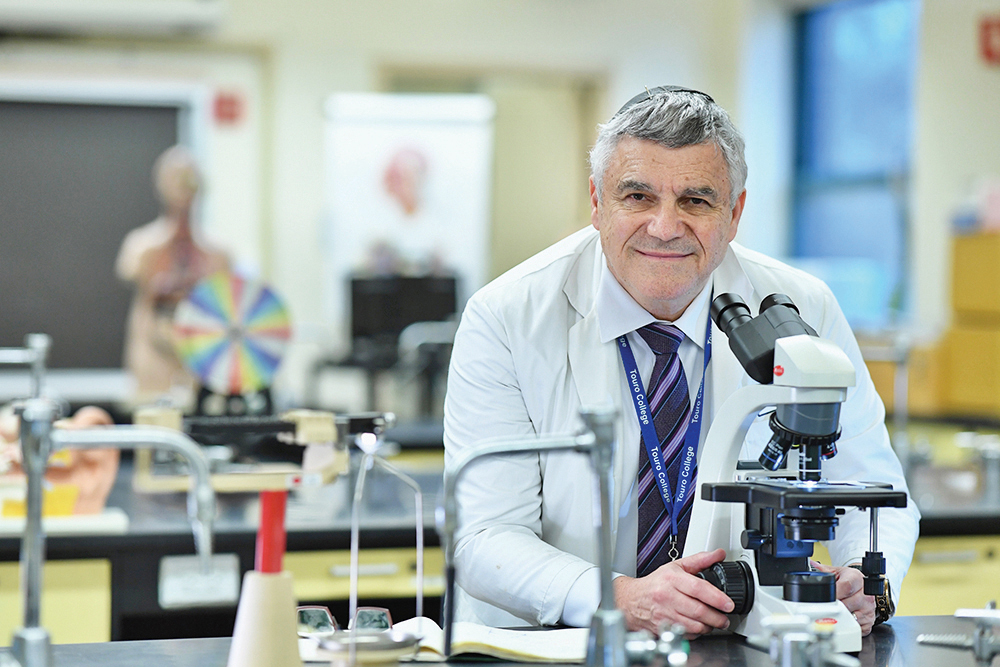Touro experts address lifesaving issue in new scientific paper.

(Courtesy of Touro University) Genetically engineered pigs could meet a dire need for patients in need of organ transplants. But does this cutting-edge procedure align with Halacha? A new scientific paper, published in Jewish Ethics in Medicine, explores the future of animal organ transplantation through the lens of Jewish beliefs and traditions. The paper is co-authored by Dr. John D. Loike, bioethicist and professor at Touro University, and Rabbi Moshe Krupka, Touro University executive vice president.
“Only about 50% out of 100,000 Americans waiting for transplants each year will find a human donor,” Loike pointed out. To fill this gap, scientists have begun exploring alternatives to human organ donations. Xenotransplantation involves transferring living cells, tissue or organs from one species to another. Lately, xenotransplantation research has been primarily focused on leveraging pig organs, like kidneys and hearts, for humans in need. Early results have been promising: The first successful pig-to-human heart transplant occurred in January of 2022, and that patient survived for 50 days.
While much research remains to be done, the emergence of xenotransplantation as a potentially viable and lifesaving solution for humans represents a new frontier in medicine as well as ethics. Yet the use of pig organs in humans raises questions. Pigs are not kosher and the Torah discusses not handling or touching these animals, as well. There have been times throughout history when Jews did not raise pigs or sell pork. But much of the hesitation is more rooted in historical practices and taboos than religious law. While there have been historical bans on using pigs for food or commercial purposes, there’s never been a restriction on “gaining benefit from pigs.” Indeed, xenotransplantation offers one of the most important benefits of all: the benefit of saving a life.
In Jewish law, the value of human life trumps all else. Under Jewish teachings, animals can be sacrificed for food or medicine that will benefit human life. That’s because humans, created in the image of God, “enjoy a unique and higher dignity than other animals,” noted Loike in his paper.
However, Jewish law clearly forbids animal suffering and Loike noted that “causing any unnecessary pain to animals is prohibited as stated in the Torah: ‘You shall not see your brother’s donkey or his ox fallen [under its load] on the road, and ignore them.’” Judaism requires people to ensure that animals are comfortable and fed. While Judaism says that animals can be utilized to keep humans healthy and alive, those animals cannot be abused or made to suffer in the process. These teachings should have a guiding impact on how animals bred for transplantation are housed, fed and treated.
Though xenotransplantation is new, the use of non-kosher animal products for medical purposes is not. Animal products have been used to create insulin, medical devices, and even to treat severe burns. Judaism has always supported these lifesaving interventions.
There must be guard rails, however, around this type of medical exploration. Loike wrote in his study, “Judaism teaches that human beings must always consider whether a new technology will better the world or elicit destruction.” While Judaism teaches that humans should partner with God to develop and preserve the world, that doesn’t give us “carte blanche” to pursue new technologies. Logical reasoning must always be applied to new breakthroughs, and careful thought must be given to potential larger consequences. When it comes to xenotransplantation specifically, millions of donor pigs will need to be bred to meet the needs of human patients. How will these animals be treated? What impact will this large-scale breeding have on our climate and environment? Judaism teaches that these questions must be carefully considered before moving forward.
While there are many details to consider, xenotransplantation holds exciting possibilities for the future of treating diseases and saving human lives.
“For the thousands of people who need organ transplants, my hope is that xenotransplants will offer a successful clinical option until scientists master stem cell technology to engineer human organs,” said Loike.









